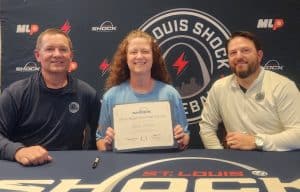CASA cares for kids

April is designated as National Child Abuse Prevention Month by the U.S. government and numerous organizations which work toward caring for and improving the lives of young people suffering neglect and abuse.
One such local organization is the Court Appointed Special Advocates of Southern Illinois which continues to ensure that young people in foster care have the voice and representation that they need.
CASA Executive Director Mechiko White spoke briefly about the organization – which is located in Belleville and operates in the judicial systems of St. Clair, Madison, Monroe and Randolph counties – and the goal behind this month’s observance.
“What it set out to do is bring the attention and the spotlight on abused and neglected children or children that have experienced abuse and neglect,” White said. “Our mission is to repair the abuse or the trauma that a child has faced.”
She further spoke on the abuse children can experience, emphasizing that the organization’s volunteers – who directly work with the children to explain their situation in court – can have a tremendous impact.
“Child abuse is still here, unfortunately,” White said. “Our CASA volunteers, they see the glass of water half-full instead of half-empty, and they actually believe that they can change the course and change a child’s life.”
One of these volunteers is Rosie Tindall, a retired special education teacher who began working with CASA back in 2021 as she was looking for a way to spend her time in a way that felt beneficial for others.
As she described it, she essentially serves as an advocate for the handful of children she’s assigned to who have experienced some abuse or neglect – she first started with a group of three – meeting with them each month to discuss their current living situations.
These meetings sometimes happen virtually – this was mainly the case at the start of the COVID-19 pandemic – though they typically take place in-person.
Volunteers like Tindall also meet with a child’s foster family, teachers, counselors and others who regularly interact with them. They also go to the child’s home to observe the environment they’re staying in.
They record their observations and conversations, compiling this information in reports that are presented to the judge overseeing the child’s case.
Tindall spoke to what originally got her interested in working with CASA and her reason for continuing to advocate for children in need.
“I’ve always loved kids,” Tindall said. “I taught for 37 years. I just always feel like children are our most important resource, our most valuable resource. In my line of work, as a teacher, you see all kinds of home situations, living situations. I just felt that it was important for children. It really is hard to realize that there are kids out there who do not have the same kind of loving home that I grew up in. I feel like they do need a voice. They do need someone looking out for them.”
Tindall was recently recognized within the organization as she received a volunteer of the year award, and while she expressed her appreciation for the honor, she noted that she never set out to receive any recognition.
“I enjoy what I do,” Tindall said. “It’s a blessing for me to work with the kids. That’s what I wanted to do is help children in need.”
Another volunteer with this area’s CASA organization is Patricia Manning. As she recalled, she became interested in CASA after seeing a brochure provided by the Monroe County House of Neighborly Service that her husband and daughter brought back from the farmer’s market.
Manning described how she fell into a rabbit hole of research concerning CASA and their work.
“There was something that compelled me to do it,” Manning said. “I think it was that they said ‘Hundreds of children in Southwestern Illinois are waiting on somebody to help them have a voice.’ And that is what really compelled me to keep reading.”
Like Tindall, Manning began volunteering at the start of the pandemic, getting her training over Zoom. She recalled hearing stories about abuse which only served to reinforce her desire to help.
She also mentioned that her perspective on foster care has changed drastically as she’s been volunteering for CASA.
Previously, she assumed that kids in foster care were well taken care of, but she now has the experience to have seen that, in many cases, case workers that she works with are stretched terribly thin, and there can be many competing interests when it comes to the child’s care.
It is her job, then, to simply be a voice for the kid in court.
Manning spoke about how she meets with the children she’s charged with, working to ensure that their needs are met – even when they’re as simple as getting a pair of glasses.
Similarly to Tindall, Manning said she continues her work with CASA out of a sense of obligation and wants to do something with her time to help others.
“I feel like it’s so important for me to be an active contributor to the community, like an active, director contributor to the community,” Manning said. “I think it’s important to look out for each other, and that includes the people who are in the foster care system.”
Still another volunteer with CASA is Monica Hatch, a retired SWIC English professor who, like Tindall, was looking for a way to keep busy in retirement.
Currently working with two young children who are currently in very positive living situations, she said that one of her key goals as a volunteer is the same as when she was a teacher: empowerment.
Hatch also referenced the creation of Southwestern Illinois’ CASA organization, pointing out how the founder, Judge Milton Wharton – along with St. Clair County courts and the Belleville Area Foster Parents Association – was frustrated at the lack of information he had when deciding these sorts of cases in court and wished to flesh out the work that case workers do.
She added that CASA as it currently is certainly meets its original goals.
“It is exactly what the judges wanted it to be, and that is to be the eyes and the ears of the court in the home,” Hatch said.
She also spoke about some of her general experiences as a volunteer, including an interaction with a judge in which she was told how beneficial CASA reports truly are.
Hatch described how a great deal of thought goes into the reports she and other volunteers craft. In particular, they must focus on reporting only what they see and hear rather than centering their own opinions and how they perceive things.
Along these lines, Hatch also mentioned how, in her training, she became familiar with the idea of “cultural humility.” As she said, when a volunteer finds themselves in a foster family from outside their own culture or background, they have to appreciate this difference in living situation and ignore whatever biases they might have.
As the organization is always looking for more volunteers to handle the many cases that arise, Hatch spoke about the support she receives from CASA and encouraged folks to consider joining.
She pointed to the extensive training she had and how CASA’s staff are very good about keeping in touch. Hatch also mentioned the group gatherings that CASA hosts for its volunteers in order for them to exchange ideas for their work and generally serve as a support network for one another.
“I would emphasize how very supportive the staff is,” Hatch said. “Anybody that has any trepidation, the staff is really gonna help you out big time.”
Manning also spoke to the need for additional help.
“We definitely need more volunteers, and I think we’ll always need more volunteers,” Manning said. “The reason I do what I do every day and I’m not planning to give this up any time soon is because without a voice advocating for them, the kids lack resources that may make or break their spirits.”
Manning, Hatch and Tindall each expressed their desire to continue volunteering with CASA and serving as a voice for the children who need them.
For more information on CASA of Southwestern Illinois, visit casaofswil.org, call 618-234-4278 or email White at mechiko.casa@gmail.com






